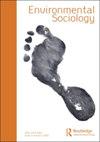天然气——环境的朋友还是敌人?通过太平洋西北部的一项民意调查评估天然气框架竞争
IF 2.8
Q3 ENVIRONMENTAL STUDIES
引用次数: 12
摘要
摘要关于天然气在北美能源结构中的作用,人们展开了激烈的争论。它曾经被视为可再生能源的桥梁燃料,现在越来越被认为阻碍了能源转型。我们探讨了俄勒冈州、华盛顿州和不列颠哥伦比亚省居民对天然气及其使用和出口的公众意见。尽管我们的许多受访者支持在发电中继续使用天然气,并认为它相对环保,但他们并不认为水力压裂(越来越成为天然气生产的主要来源)的好处大于风险。男性、政治保守派、那些将经济置于环境之上的人,以及那些不认同人为全球变暖的人,对天然气的看法更为乐观。此外,那些认为天然气更环保的人更支持天然气的使用和出口,而那些持环保观点的人则不太可能支持。本文章由计算机程序翻译,如有差异,请以英文原文为准。
Natural gas – friend or foe of the environment? Evaluating the framing contest over natural gas through a public opinion survey in the Pacific Northwest
ABSTRACT A fierce debate is raging about the role of natural gas in North America’s energy mix. Once viewed as a bridge fuel for renewable energy, it is increasingly being characterized as hindering the energy transition. We explore public opinions about natural gas, its use and export, among residents in Oregon, Washington and British Columbia. While many of our respondents supported the continued use of natural gas in electricity generation and viewed it as relatively environmentally friendly, they did not feel that the benefits of fracking (increasingly the main source of natural gas production) outweigh its risks. Males, political conservatives, those who prioritized the economy over the environment, and those who didn’t subscribe to anthropogenic global warming felt more favorably toward natural gas. Furthermore, those who saw gas as more environmentally friendly were more supportive of gas usage and export, while those with pro-environmental views were less likely to support it.
求助全文
通过发布文献求助,成功后即可免费获取论文全文。
去求助
来源期刊

Environmental Sociology
ENVIRONMENTAL STUDIES-
CiteScore
4.60
自引率
12.00%
发文量
34
期刊介绍:
Environmental Sociology is dedicated to applying and advancing the sociological imagination in relation to a wide variety of environmental challenges, controversies and issues, at every level from the global to local, from ‘world culture’ to diverse local perspectives. As an international, peer-reviewed scholarly journal, Environmental Sociology aims to stretch the conceptual and theoretical boundaries of both environmental and mainstream sociology, to highlight the relevance of sociological research for environmental policy and management, to disseminate the results of sociological research, and to engage in productive dialogue and debate with other disciplines in the social, natural and ecological sciences. Contributions may utilize a variety of theoretical orientations including, but not restricted to: critical theory, cultural sociology, ecofeminism, ecological modernization, environmental justice, organizational sociology, political ecology, political economy, post-colonial studies, risk theory, social psychology, science and technology studies, globalization, world-systems analysis, and so on. Cross- and transdisciplinary contributions are welcome where they demonstrate a novel attempt to understand social-ecological relationships in a manner that engages with the core concerns of sociology in social relationships, institutions, practices and processes. All methodological approaches in the environmental social sciences – qualitative, quantitative, integrative, spatial, policy analysis, etc. – are welcomed. Environmental Sociology welcomes high-quality submissions from scholars around the world.
 求助内容:
求助内容: 应助结果提醒方式:
应助结果提醒方式:


